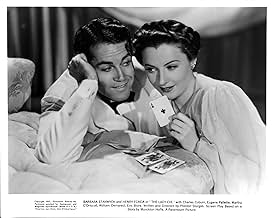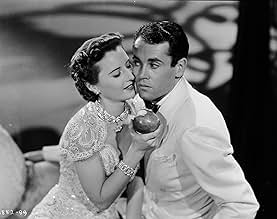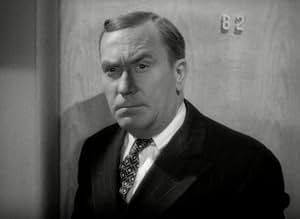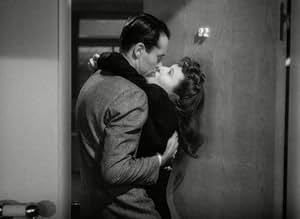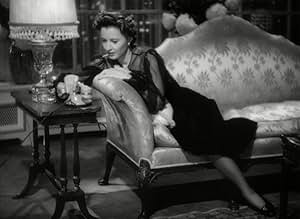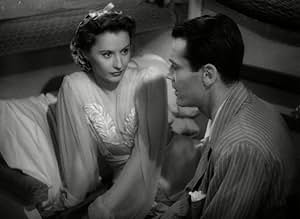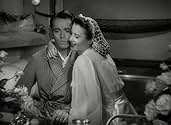CALIFICACIÓN DE IMDb
7.7/10
25 k
TU CALIFICACIÓN
Un trio de estafadoras tiene por objetivo al tímido millonario heredero de una cervecera, hasta que una de ellas se enamora de él.Un trio de estafadoras tiene por objetivo al tímido millonario heredero de una cervecera, hasta que una de ellas se enamora de él.Un trio de estafadoras tiene por objetivo al tímido millonario heredero de una cervecera, hasta que una de ellas se enamora de él.
- Dirección
- Guionistas
- Elenco
- Nominado a 1 premio Óscar
- 5 premios ganados y 1 nominación en total
Abdullah Abbas
- Man with Potted Palm
- (sin créditos)
Norman Ainsley
- Sir Alfred's Servant
- (sin créditos)
Mary Akin
- Passenger on Ship
- (sin créditos)
Sam Ash
- Husband on Ship
- (sin créditos)
Harry A. Bailey
- Lawyer
- (sin créditos)
Bobby Barber
- Ship's Waiter with Toupee
- (sin créditos)
- Dirección
- Guionistas
- Todo el elenco y el equipo
- Producción, taquilla y más en IMDbPro
Opiniones destacadas
As a lifelong Preston Sturges fan, I find the problem with submitting 'user comments' on his films to be twofold. The first is where to begin, the second how to stop. A third problem (growing out of the first two) manifests itself immediately upon watching a flawless jewel like THE LADY EVE: why even bother to praise it? No matter how accurate or elegant a rave you write, they'd still be merely words, and words can't do Sturges justice...not after hearing and seeing his own words spinning like a thousand plates over the 90-odd minutes it takes for this film to utterly captivate you. Unlike many black-and-white products of the studio era, which generate condescension or apathy among the Gen X'ers of today (when do we get to Gen Z - or are we there already?), the Sturges cult grows with every passing year, as younger fans fall under his spell, drawn initially to his work for the still-startling energy of the stream of raspberries he blew at the Production Code. (In this sense, EVE marks a high point; it's all about sexual gamesmanship, and its tone is both matter-of-fact and dizzyingly playful at the same time.) But hopefully, they're coming for the sizzle and staying for the steak. Like all Sturges' Paramount films, EVE is an embarrassment of riches - a boudoir farce, a slapstick clinic, a cynical dialogue comedy AND a love story of great, soulful heart. It's especially recommended to anyone beset by misery and tribulation as a guaranteed restorative and cure-all. When a movie from any era can so completely take you out of yourself and lift the blackest of clouds without resorting to any cheapjack plot-gimmicks or trite manipulation of an audience's emotions, all you can do is be grateful. Though the unfailingly superb Sturges Players are on hand, in fine form (including of course his human rabbit's foot, Wm Demarest) EVE features a number of actors making their first and only appearances in a Sturges-directed film: Stanwyck, Fonda, Eric Blore, Melville Cooper and perennial Fonda cohort Eugene Pallette. All of them take to the material like catnip, making one long for an alternate reality in which Preston Sturges could have remained unmolested at Paramount for 20 years and a dozen more films than he actually made, not only to see this cast reunited, but to see what might have resulted from any number of quality actors being exposed to the hothouse atmosphere of his screenplays. That it never worked out that way is one more reason to treasure THE LADY EVE.
This is an interesting combination of talents and material that works very well, thanks most of all to Preston Sturges's ability to create a distinctive feel to his pictures. "The Lady Eve" has many of the elements familiar to screwball comedy, and yet it is something a little different, a little more than the oddball characters and comical plot developments.
Barbara Stanwyck has quite an interesting role that allows her at times to assume several different personas. She shows good versatility, and effectively brings out the different sides of her character's nature. Henry Fonda works better than you would expect in such a comic picture. He is wisely used as a straight man most of the time, and even his occasional stiffness actually fits the role.
Much of the supporting cast gets only limited opportunities, but they are generally good also, especially Charles Coburn, who is perfectly cast as Stanwyck's shifty father.
There are many amusing moments, yet often with a current of humanity underneath. Sturges and the cast keep the laughs coming while also making sure that you care about the characters.
Barbara Stanwyck has quite an interesting role that allows her at times to assume several different personas. She shows good versatility, and effectively brings out the different sides of her character's nature. Henry Fonda works better than you would expect in such a comic picture. He is wisely used as a straight man most of the time, and even his occasional stiffness actually fits the role.
Much of the supporting cast gets only limited opportunities, but they are generally good also, especially Charles Coburn, who is perfectly cast as Stanwyck's shifty father.
There are many amusing moments, yet often with a current of humanity underneath. Sturges and the cast keep the laughs coming while also making sure that you care about the characters.
Henry Fonda and Barbara Stanwyck light up the delightful Preston Sturges comedy, "The Lady Eve." Stanwyck plays a dual role as a con artist who falls for a mark, Henry Fonda, on board a ship and then, angry with his rejection of her, reappears in his life later as a member of the British upper class - you got it, the Lady Eve.
Fonda is hilarious as a clueless child of privilege. Always the most subtle, internalized of actors, his facial expressions are priceless, as is his slapstick.
The funniest scene takes place on a train when, as the train races along the tracks, Eve recounts her various love affairs while Fonda becomes more and more flummoxed.
Betty Grable got a lot of publicity for her legs, but Stanwyck's were the best, shown to great advantage here, as is the rest of her gorgeous figure. She's fantastic in this and has great chemistry with Fonda.
Stanwyck always creates a whole character, and she does here as well (in fact, two of them) as a woman who is smart, independent, vulnerable in love, and conniving when angry.
A great comedy, not to be missed.
Fonda is hilarious as a clueless child of privilege. Always the most subtle, internalized of actors, his facial expressions are priceless, as is his slapstick.
The funniest scene takes place on a train when, as the train races along the tracks, Eve recounts her various love affairs while Fonda becomes more and more flummoxed.
Betty Grable got a lot of publicity for her legs, but Stanwyck's were the best, shown to great advantage here, as is the rest of her gorgeous figure. She's fantastic in this and has great chemistry with Fonda.
Stanwyck always creates a whole character, and she does here as well (in fact, two of them) as a woman who is smart, independent, vulnerable in love, and conniving when angry.
A great comedy, not to be missed.
On the surface of it, THE LADY EVE is a delightfully shallow evening's entertainment. It's a clever little film, filled with great dialogue ("Don't be vulgar, Jean. Let us be crooked, but never common.") and eccentric characters, from the leading lady Jean (a marvellous Barbara Stanwyck) and her much-beleaguered main man Charlie Pike (Henry Fonda) down to the other con artists that make up Jean's circle, including her dad Harry (Charles Coburn), sidekick Gerald (Melville Cooper) and Sir Alfred McGlennan Keith (Eric Blore)... or just Pearlie for short. Charlie is heir to the Pike Ale fortune, and while on a cruise home from South America, Harrington father and daughter decide to take the hapless lad to the metaphorical drycleaners. What neither of them gambles on is a romance that was always in the cards for Jean and Charlie. But just as Jean is about to go 'straight' for Charlie, he discovers that his girlfriend is part of a con racket, and unceremoniously dumps her. Hurt and determined to get revenge for his cruel parting words, Jean initiates a farce as the Lady Eve Sidwich of the film's title and infiltrates Charlie's home and heart again. She quickly teaches him a lesson he'll never forget, just as she realises how much she really still loves Charlie.
Story-wise, then, it's no doubt that THE LADY EVE provides fine frothy entertainment. Pair that with the surreal touches added into the film by Preston Sturges (take for example the supposedly climactic scene in which Charlie repeats his words of love to Eve--Fonda never gets to play the scene straight, even though he has to maintain a stony face as his horse keeps butting into his speech... presumably to try to get him to stop talking!), and there's certainly plenty to keep one occupied as is. The film is, of course, a screwball comedy absolutely bent on throwing every possible obstacle it can into the path of its intended couple, coming up with more twists than you expect...
However, thanks largely to the brilliant writing and direction provided by Sturges, it actually also plays very close and very insightfully to the theme of what Stanley Cavell calls 'remarriage comedy'. The idea behind this is that legal or religious marriages, the 'first' marriages of the couple concerned in such comedies, are actually sham marriages. It isn't saying 'I do' or signing a piece of paper that makes a marriage a marriage; it's the behaviour of the couple, their own endorsement, that makes it a true marriage. This theme is reflected in, for example, THE AWFUL TRUTH, which sees Lucy and Jerry Warriner divorcing (their first, sham marriage didn't work out) but getting back together again for a true, albeit not yet legalised, union. The same theme pervades THE PHILADELPHIA STORY. Preston Sturges very skilfully and effectively--but subtly!--brings this theme to his film as well. Eve and Charlie are married, but it is only when Charlie asks Jean for forgiveness and vice versa is it possible for the fact that they are married (to each other, as poor Charlie does not know!) to become significant and actually positively affirmed.
This isn't the only interesting point the film makes while appearing to be little more than a fluffy piece of entertainment--when Charlie breaks Jean's heart, she tells him, "The best [girls] aren't as good as you think they are and the bad ones aren't as bad. Not nearly as bad." She sets out to prove this, both in her fabricated 'good-girl' persona as Eve (later revealed to have had many MANY suitors) and her real 'bad-girl' con-artist self Jean (who has a soft heart and a love for Charlie that proves to be one of her virtues). Practically everyone in the film has (at least) two names by which they're known: Jean/Eve, Charlie/Hopsie, Muggsy/Murgatroyd/Ambrose, Harry/Colonel Harrington, Pearlie/Sir Alfred and so on. This suggests, quite rightly, that people are complicated complex beings, and that appearances often have nothing to do with reality. It also brings the film's story to a head--Jean and Charlie can never be happy together until Charlie can accept Jean as she is, and this he presumably will have learnt through his short, disastrous 'marriage' to Eve.
Stanwyck and Fonda are really outstanding in this film. Stanwyck's job is to persuasively depict two characters, and then effect a blend of the two of them in the final minutes of the story, and she pulls off both the sassy, confident Jean and the elegant, British Eve perfectly. It's not hard to imagine Charlie falling hard for Jean, even with her hard-headed casing of the joint and her prospective competition (appropriately deemed second-rate) for his affections... a very memorable scene involving her make-up mirror and a narrative voice-over, the latter of which is used to great effect in the lead-up to the 'romantic scene and horse' bit which follows later in the film. Fonda has the apparently easier job of appearing mostly colourless and stodgy as he spends most of his screen time reacting to situations created by both Jean and Eve, but I contend that it must really take quite a lot of true acting ability to execute the pratfalls that he does without making Charlie such a wimp that you can't imagine Jean still wanting him at the very end. Though not quite as effective as Cary Grant, who has to do the same thing in the face of Katharine Hepburn's breathlessly effusive Susan Vance in BRINGING UP BABY, Fonda still brings a sweet charm to his role as the not-at-all-slick, often befuddled Charlie Pike. Add these two classy performances to that given by the able supporting cast, and THE LADY EVE is not just well-scripted and directed, but also very very well-acted indeed.
So, watch this film the first time just for fun--be charmed by the characters, by the dialogue, by the actors, by everything. Then watch it again to realise just how subtly and effectively THE LADY EVE actually makes several comments on marriage and on love. I highly recommend getting your hands on the Criterion Collection DVD, which has (aside from a tremendous photo gallery and interview with Peter Bogdanavich and other special features) a fantastic, thought-provoking commentary by film critic Marian Keane--it most certainly got *me* thinking!
Great film, great entertainment, great message!
Story-wise, then, it's no doubt that THE LADY EVE provides fine frothy entertainment. Pair that with the surreal touches added into the film by Preston Sturges (take for example the supposedly climactic scene in which Charlie repeats his words of love to Eve--Fonda never gets to play the scene straight, even though he has to maintain a stony face as his horse keeps butting into his speech... presumably to try to get him to stop talking!), and there's certainly plenty to keep one occupied as is. The film is, of course, a screwball comedy absolutely bent on throwing every possible obstacle it can into the path of its intended couple, coming up with more twists than you expect...
However, thanks largely to the brilliant writing and direction provided by Sturges, it actually also plays very close and very insightfully to the theme of what Stanley Cavell calls 'remarriage comedy'. The idea behind this is that legal or religious marriages, the 'first' marriages of the couple concerned in such comedies, are actually sham marriages. It isn't saying 'I do' or signing a piece of paper that makes a marriage a marriage; it's the behaviour of the couple, their own endorsement, that makes it a true marriage. This theme is reflected in, for example, THE AWFUL TRUTH, which sees Lucy and Jerry Warriner divorcing (their first, sham marriage didn't work out) but getting back together again for a true, albeit not yet legalised, union. The same theme pervades THE PHILADELPHIA STORY. Preston Sturges very skilfully and effectively--but subtly!--brings this theme to his film as well. Eve and Charlie are married, but it is only when Charlie asks Jean for forgiveness and vice versa is it possible for the fact that they are married (to each other, as poor Charlie does not know!) to become significant and actually positively affirmed.
This isn't the only interesting point the film makes while appearing to be little more than a fluffy piece of entertainment--when Charlie breaks Jean's heart, she tells him, "The best [girls] aren't as good as you think they are and the bad ones aren't as bad. Not nearly as bad." She sets out to prove this, both in her fabricated 'good-girl' persona as Eve (later revealed to have had many MANY suitors) and her real 'bad-girl' con-artist self Jean (who has a soft heart and a love for Charlie that proves to be one of her virtues). Practically everyone in the film has (at least) two names by which they're known: Jean/Eve, Charlie/Hopsie, Muggsy/Murgatroyd/Ambrose, Harry/Colonel Harrington, Pearlie/Sir Alfred and so on. This suggests, quite rightly, that people are complicated complex beings, and that appearances often have nothing to do with reality. It also brings the film's story to a head--Jean and Charlie can never be happy together until Charlie can accept Jean as she is, and this he presumably will have learnt through his short, disastrous 'marriage' to Eve.
Stanwyck and Fonda are really outstanding in this film. Stanwyck's job is to persuasively depict two characters, and then effect a blend of the two of them in the final minutes of the story, and she pulls off both the sassy, confident Jean and the elegant, British Eve perfectly. It's not hard to imagine Charlie falling hard for Jean, even with her hard-headed casing of the joint and her prospective competition (appropriately deemed second-rate) for his affections... a very memorable scene involving her make-up mirror and a narrative voice-over, the latter of which is used to great effect in the lead-up to the 'romantic scene and horse' bit which follows later in the film. Fonda has the apparently easier job of appearing mostly colourless and stodgy as he spends most of his screen time reacting to situations created by both Jean and Eve, but I contend that it must really take quite a lot of true acting ability to execute the pratfalls that he does without making Charlie such a wimp that you can't imagine Jean still wanting him at the very end. Though not quite as effective as Cary Grant, who has to do the same thing in the face of Katharine Hepburn's breathlessly effusive Susan Vance in BRINGING UP BABY, Fonda still brings a sweet charm to his role as the not-at-all-slick, often befuddled Charlie Pike. Add these two classy performances to that given by the able supporting cast, and THE LADY EVE is not just well-scripted and directed, but also very very well-acted indeed.
So, watch this film the first time just for fun--be charmed by the characters, by the dialogue, by the actors, by everything. Then watch it again to realise just how subtly and effectively THE LADY EVE actually makes several comments on marriage and on love. I highly recommend getting your hands on the Criterion Collection DVD, which has (aside from a tremendous photo gallery and interview with Peter Bogdanavich and other special features) a fantastic, thought-provoking commentary by film critic Marian Keane--it most certainly got *me* thinking!
Great film, great entertainment, great message!
The Lady Eve is one of the most memorable comedies of the golden age, and today it stands as a highly entertaining movie that has a lot of enjoyably dated comedy. Particularly hilarious are the scenes in which Stanwyck spills her life story to Fonda as they swoosh under the train tunnel, and the scenes in which the food trays keep spilling on Fonda. The performances are great, and though it seems more like Stanwyck falls for Fonda out of pity more than love, the two work well together. And Barbara Stanwyck in that black, bare-midriff dress is one of the most breath-takingly beautiful images ever to appear on the screen.
¿Sabías que…?
- TriviaIt was hibernation season during the shoot, and Emma the king snake was always sleeping while also shedding her skin. Needless to say, she was very uncooperative.
- ErroresWhen Charles first meets "the Lady Eve Sidwich" at the party, his face goes from blank expression to shock twice - first with all characters, then in closeup.
- Créditos curiososA very large cartoon snake displays the opening credits while twining around an apple tree.
- ConexionesEdited into Spisok korabley (2008)
Selecciones populares
Inicia sesión para calificar y agrega a la lista de videos para obtener recomendaciones personalizadas
Detalles
- Fecha de lanzamiento
- País de origen
- Idioma
- También se conoce como
- The Lady Eve
- Locaciones de filmación
- Productora
- Ver más créditos de la compañía en IMDbPro
Taquilla
- Total a nivel mundial
- USD 15,142
- Tiempo de ejecución1 hora 34 minutos
- Color
- Relación de aspecto
- 1.37 : 1
Contribuir a esta página
Sugiere una edición o agrega el contenido que falta

Principales brechas de datos
By what name was Las tres noches de Eva (1941) officially released in India in English?
Responda

